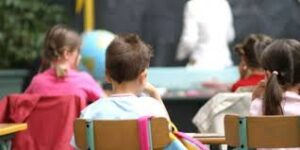Canadian study, schools are not Covid hotspots

The question that every parent, teacher and student has been asking for a long time and that will return as a woodworm in September, is one: how safe are schools when it comes to Covid-19 transmission? A Canadian study tried to answer the question.
More than 1,600 Vancouver school district employees and teachers were monitored for three months: their blood was analyzed for Covid-19 antibodies that would show that they had already come into contact with the virus. The study authors say their results, released today, found that infection rates were no greater among staff than other adults in the general public. “Science suggests that the risk of secondary transmission in schools is low, low,” Dr. Pascal Lavoie, a pediatrician and associate professor at the University of British Columbia, and one of the study’s authors told CTV News.
It’s a timely study, as officials across Canada are trying to decide whether or not to reopen schools next fall and what the reopening might look like.
Research shows that most of those who have been infected have contracted Covid from contact with a friend or relative and not in the school environment.
A key part of the study was to test antibodies on a large number of teachers and staff, in order to capture asymptomatic cases, instead of relying only on the number of teachers and staff who had experienced symptoms and then tested positive for Covid-19. “Antibodies are a sign that someone has had an infection in the past – explained Lavoie – and once you are infected, the antibodies will remain active for at least a year, maybe more. So it is a sensitive way to detect all previous infections. What I’ve been trying to figure out is whether there could be a layer of asymptomatic infection that we don’t detect in schools.”
Lavoie said the results showed that the risk of being in a physical school that was taking precautions against Covid-19 was essentially the same risk of “living in a community,” even when asymptomatic transmission is taken into account. “The level of infection in the population of school workers in Vancouver’s school board was equivalent to the infection rate in people who do not work in schools, but live in the same community – Lavoie noted – I could not find any scientific justification based on a safety problem, to justify the closure of schools.”
Saba Merchant, an Ontario pediatrician, says the data in support of keeping schools open is strong. “The study is telling us that we need to get children back to school as soon as possible,” she said, “scientific models tell us that the risk is low.” What was not mild, according to the pediatrician, is the repercussion that not going to school had on children: “I saw an increase in signs and symptoms of anxiety, depression, obsessive-compulsive tendencies, eating disorders, obesity levels,” Merchand said.
The findings of this new study could likely have the greatest impact in Ontario, which has closed schools for about 25 weeks since the pandemic began, a longer stretch than any other jurisdiction in Canada. As one of the provinces hardest hit by the pandemic, the measure has been seen as necessary by some, and too harsh by others.


